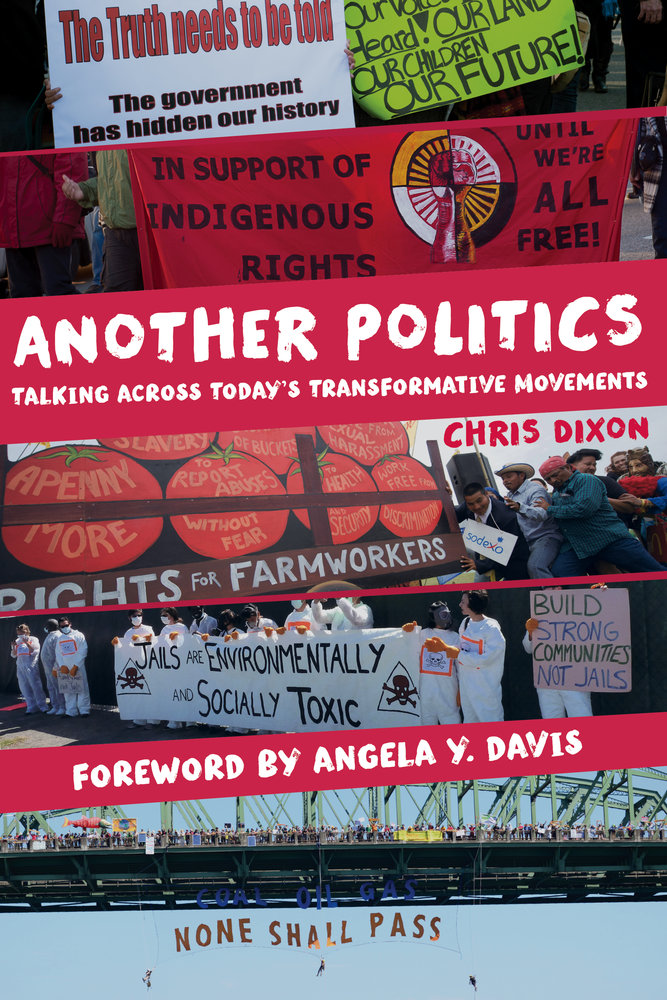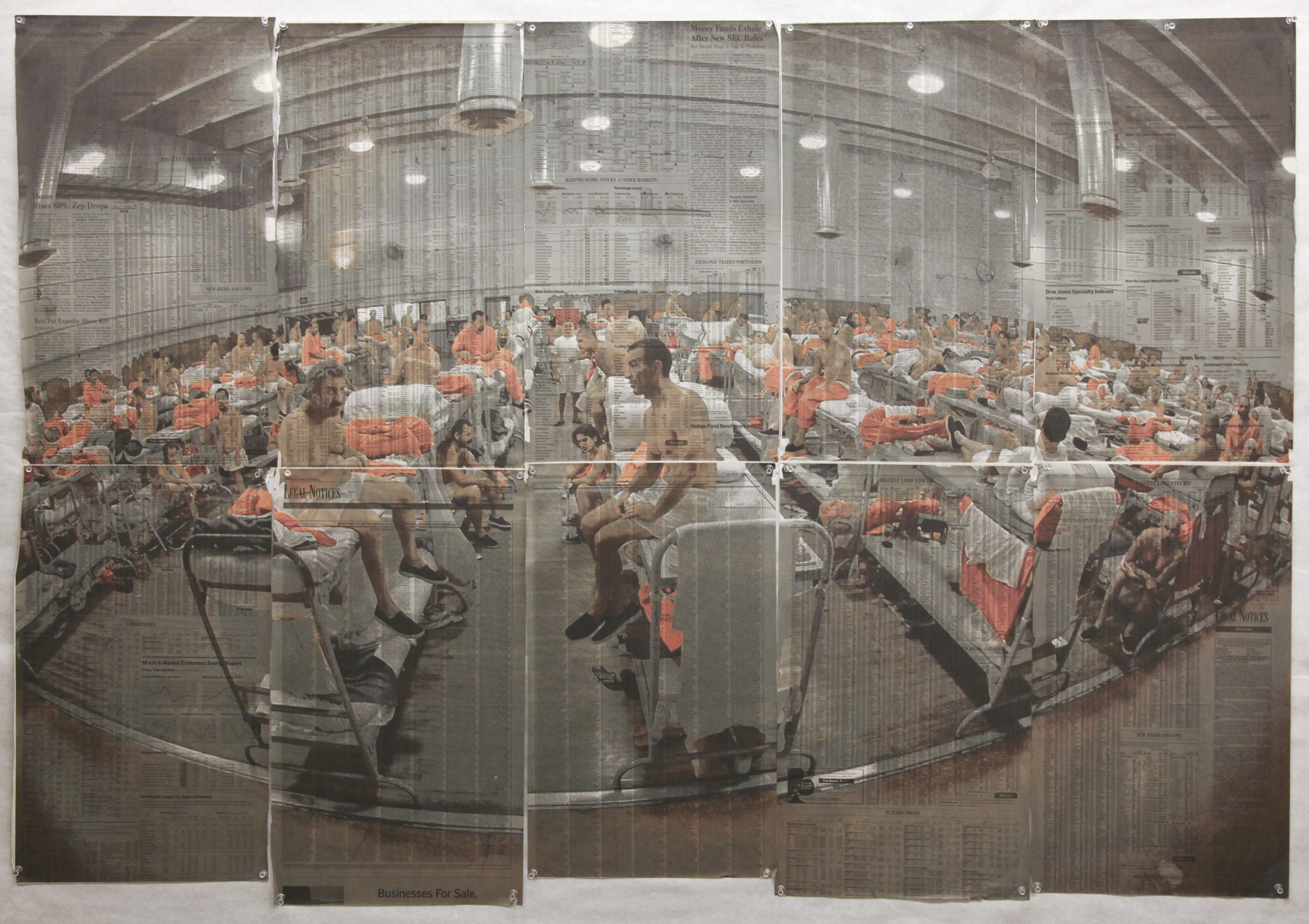This review of Chris Dixon’s Another Politics appears in the current issue of Perspectives, available here from AK Press.
It was one of those meetings where the room we booked was far too large for the number of people who actually showed up. It was the type of meeting where you rearrange the chairs to form a small circle in a corner so that the disappointing turnout feels less deflating. Myself and three other members of No One Is Illegal-Toronto huddled to discuss two fledgling campaigns we were involved in. The first was the awkwardly named “Don’t Ask, Don’t Tell”1 campaign that hoped to mobilize toward a municipal policy that would bar city staff from asking for immigration identification or reporting someone’s immigration status to the authorities. The second was our anti-deportation direct action casework, which evolved from a model developed by the Ontario Coalition Against Poverty to fight welfare bureaucracy. We had faced a soul-sucking defeat earlier that year following the deportation of beloved community activist Queen Nzinga, who was arrested by Toronto police at a bake sale during International Women’s Day. It was mid-summer 2005, and the day-to-day grind of organizing had taken its toll on our collective energies. Without the bulk of the group’s members, we decided to not have any discussions about nuts and bolts of organizing upcoming events or actions and instead have a more general conversation about the direction of our collective.  It was in that discussion that I first became aware of what Chris Dixon (2014) explains, in his book Another Politics: Talking Across Today’s Transformative Movements, is a fundamental principle underlying the antiauthoritarian current in today’s social movements: we were trying to figure out how to work “in the space between our transformative aspirations and actually existing social realties” (8). We saw in those campaigns two very different yet interconnected desires – the prefigurative aspirations of a world where people had the freedom to move and the freedom to stay, and the struggle to dismantle the state, capitalism, and the white supremacist settler colonial logics that undergird Canada’s immigration laws.
It was in that discussion that I first became aware of what Chris Dixon (2014) explains, in his book Another Politics: Talking Across Today’s Transformative Movements, is a fundamental principle underlying the antiauthoritarian current in today’s social movements: we were trying to figure out how to work “in the space between our transformative aspirations and actually existing social realties” (8). We saw in those campaigns two very different yet interconnected desires – the prefigurative aspirations of a world where people had the freedom to move and the freedom to stay, and the struggle to dismantle the state, capitalism, and the white supremacist settler colonial logics that undergird Canada’s immigration laws.
#Anarchism
Beyond Absolutes: Justice for All
by Megan Petrucelli
Anarchism outlines egalitarian ways of relating. We are encouraged to denounce systems of domination and control in favor of structures of interaction that promote liberation, collectivism, acceptance of differences, and meeting the needs of all. In anarchism, there is an emphasis on inclusivity, listening to … Read more
Breaking the Chains of Command: Anarchist Veterans of the US Military, by Brad Thomson
This piece appears in the current issue of Perspectives on Anarchist Theory, N. 28, on Justice available from AK Press here. Brad received an Institute for Anarchist Studies writing grant to assist in the completion of this piece.
“War is the health of the State” – Randolph Bourne, written during WW I
“Mutiny is the conscience of war” – Common trench graffiti during WW I
Introduction
War and military occupation are among the most overwhelming demonstrations of state power. Rooted in an anti-state analysis, the anarchist position on geopolitical power struggles between nation-states is unequivocal opposition, especially in reference to international interventions by the US military.
The logical conclusion might be that anarchists should categorically oppose the individuals who are part of the institution of the US military: the troops. Similarly, it may follow that those people who make up the military and veterans would be among the most hostile toward anarchist ideals and action.
However, through my involvement in anti-war movements and anarchist circles over the last ten years, I have encountered a surprising number of anarchists opposed to the US military who are themselves US veterans. For many of them, their experience as GIs (“Government Issue,” a nickname commenting on the fact that service members are treated as government property) played a significant role in forming and developing their anti-authoritarian and anarchist analysis. What follows is based on interviews with a number of anarchists and anti-authoritarians who also happen to be military veterans.

(Chicago, 2012: US military Vets throw their medals back during anti-NATO protests. This is Jacob George, a vet who I had hoped to interview as part of the project, who later took his own life.)
Lexicon Recordings!
In an effort to make our Lexicon series more accessible, we have posted recordings of the essays on each pamphlet’s page. From the Lexicon page, click on a cover to hear the recording of that pamphlet or to download a printable booklet pdf.
Writing Grant Deadline: January 15th, 2016
Since the inception of the Institute for Anarchist Studies in 1996, the grant program has been a central project. By awarding grants to radical writers and translators around the world — many of whom work without the support of academic institutions, and are connected in important ways to the movements about which they write — the IAS has tried to support the development of the theoretical tools necessary for critiquing the systems of domination in which we are enmeshed as well as developing alternatives in order to maximize freedom, justice, and dignity.

The IAS grants thousands of dollars annually to writers and translators treating themes of significance to the development of contemporary anarchist theory and practice. Projects are awarded between $250 and $1,000 in our yearly funding round. Applications are due on January 15, 2016, by midnight EST; late applications will not be accepted. The IAS also provides editorial assistance to grant recipients, who commit to completing their projects in the six months following their award. Moreover, the IAS publishes many of the finished essays in its print and/or online journal Perspectives on Anarchist Theory, or in some cases, as part of its Anarchist Interventions book series, among other publishing projects.
Our next deadline is: January 15, 2016, by midnight EST.
Ecology or Catastrophe: The Life of Murray Bookchin by Janet Biehl, Review by Chuck Morse

Murray Bookchin was a pivotal, polarizing figure in the post-WWII history of anarchism. He put ecology and democracy on the anarchist agenda in a way that was as novel as it is enduring. As a polemicist, he spent decades at the center of crucial debates about history, strategy, and foundational ideals. Even his critics must acknowledge that he made major contributions to the growth and clarification of the anarchist perspective.
Something shifted in the movement when he died in 2006. For the preceding fifty years, his writings had been a point of reference through which we could clarify our views, even when we disagreed with them, whereas now that he was gone we had to make sense of him. Who was he and how had he lived? These are compelling questions for those who had worked with him and for anyone who wants to understand contemporary anarchism.
Hunger Strikes, Dignity and Freedom Amidst the “War on Terror,” by Brooke Reynolds
This piece originally appears in issue N. 28 of Perspectives on Anarchist Theory, available from AK Press.
“I will carry my soul in my hand
/ And throw it in the valleys of death /
It is either a life that makes a friend happy
/ Or a death that makes an enemy angry.” –Abdulrahim Mahmoud, Palestine
“When the will is free and the cause is just, and you embody both, the human is capable of making miracles happen, and no oppressive, tyrannical, murderous regime can harm it” -Ameer Makhoul, Palestine
“Sometimes I sit in the chair and vomit. Nobody says anything. Even if they turned their backs I would understand. I’m looking for humans. All I ask for is basic human rights.” –Emad Hassan, Guantánamo Bay

(Photo by Max Collins)
Insurgent Islands: A Continuing Conversation on Anarchism with Principles, by Kevin Van Meter
“Freely Disassociating” appeared in June 2015. Although it was written a year prior, the half dozen Left and radical publications to which it was initially submitted would not print it. Since its publication by Perspectives on Anarchist Theory inquiries and positive responses (such as Scott Campbell’s, on which I have commented upon elsewhere ) have found their way to me either directly or through intermediaries. Of course there was a series of irrational and nonsensical comments online that only served to confirm my claim that there isn’t an “audience that can access arguments and positions outside those with which it already agrees.” And for that matter, the positive responses confirm this as well. What is interesting about those who are generally supportive of my arguments is that they often agree with the analysis of the problems that currently exist in radical movements, but are neither able to completely disassociate from the “tyrannical bitterness” of contemporary radical politics nor to engage with the proposal that anarchism with principles will arise from a political project rather than being proposed a priori.
What I had not fully articulated in the original article is that until there is a counter-pole to current radical movements there cannot be a shift toward creating anarchism with principles. It would violate common sense to suggest that you can decrease X (involvement in radical movements as they are currently composed) and as a result Y (a counter-pole, anarchism with principles) would emerge. Our increasingly ideological anarchism is defined by theoretical practices: the setting of ones own limitations rather than common horizons; obsession with imaginary relations instead of relations between anarchism’s collective imagination and the ability to collectivize them in the world; and there is not a Yes to many, many No’s reversing the call for “One No, Many Yeses.” It is these practices that anarchism with principles seeks to counter. Moreover, and possibly more important, two interrelated problems suggest the need for another passage out of the current malaise. The approach of creating forms of organization, from clandestine cells to non-profits, a priori to the desires and activity that will propel them forward, postulate purpose, set priorities, and provide the content and context in which they will operate is fatal. This is exacerbated by the inability to make a clean break from current radical movements and instead align oneself with the rich, substantive history of revolutionary ideas and practices. Until these three separate issues are properly addressed the preconditions required for anarchism with principles to develop cannot be established. I will take each issue in turn.
Towards a Fatter Insurrection: Introduction to a Revolutionary Body Liberation Movement, by Shane Burley
After Jessica parked, she was too busy juggling her phone and keys to notice the crowd of teenage boys moving toward her vehicle. As she got out she immediately recognized what was happening. It wasn’t the first time. She began walking to the café as … Read more
Towards an Anarchism with Principles: A Response to “Freely Disassociating,” by Scott Campbell

I read with interest Kevin Van Meter’s recent essay, Freely Disassociating: Three Stories on Contemporary Radical Movements published by Perspectives on Anarchist Theory on the Institute for Anarchist Studies website. In it, he discusses the current climate within the anarchist movement, painting a grim picture where increasingly meaningless labels and judgments get tossed about like political hand grenades, shutting down discussion, utilizing guilt-by-association, fomenting an atmosphere of anti-intellectualism and devolving into moralizing-outrage-as-activism. In his third of the three anecdotes he shares, he also elaborates how association with the anarchist movement can lead to unreasonable expectations and standards being placed on an individual. As a result, the radical movement has largely become a void consumed by the loudest voices or the latest controversy, leading people to disassociate from it.
Facing this scenario, Van Meter argues for developing an “anarchism with principles” based in a milieu of “working class, and revolutionary, intellectual culture.” The principles would emerge through dialog, debate, organizing and application in struggle.




